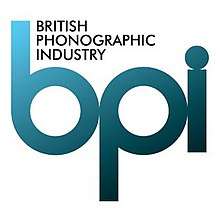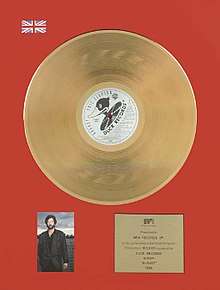British Phonographic Industry
The BPI (British Recorded Music Industry) Limited, commonly known as the British Phonographic Industry or BPI, is the British recorded music industry's trade association.
 | |
| Abbreviation | BPI |
|---|---|
| Formation | 1973 |
| Legal status | Non-profit company |
| Purpose | Music industry in the United Kingdom |
| Location |
|
Region served | United Kingdom |
Membership | British music companies |
Chairman | Ged Doherty |
Chief Executive | Geoff Taylor |
Main organ | BPI Council |
Budget | NA |
| Website | www |
Structure
Its membership comprises hundreds of music companies including all three "major" record companies in the UK (Warner Music UK, Sony Music Entertainment, and Universal Music Group), and hundreds of independent music labels and small to medium-sized music businesses.
History
It has represented the interests of British record companies since being formally incorporated in 1973 when the principal aim was to promote British music and fight copyright infringement.
In 2007, the association's legal name was changed from British Phonographic Industry Limited (The).
Awards
It founded the annual BRIT Awards for the British music industry in 1977, and, later, The Classic BRIT Awards. The organising company, BRIT Awards Limited, is a fully owned subsidiary of the BPI. Proceeds from both shows go to the BRIT Trust, the charitable arm of the BPI that has donated almost £15m to charitable causes nationwide since its foundation in 1989. In September 2013, the BPI presented the first ever BRITs Icon Award to Sir Elton John. The BPI also endorsed the launch of the Mercury Prize for the Album of the Year in 1992.
The recorded music industry's Certified Awards program, which attributes Platinum, Gold and Silver status to singles, albums and music videos (Platinum and Gold only) based on their sales performance (see BPI Certified Awards program), has been administered by the BPI since its inception in 1973. In September 2008, the BPI became one of the founding members of UK Music, an umbrella organisation representing the interests of all parts of the industry.
The BRIT Trust
The charitable arm of the BPI, the trust was conceived in 1989 by a collection of leading music industry individuals with a mission to give young people a chance to express their musical creativity regardless of race, class, sex or ability. The BRIT Trust is the only music charity actively supporting all types of education across the entire spectrum of music. Through the projects it supports, which include Nordoff-Robbins Music Therapy and the BRIT School, the Trust offers young people the opportunity to enhance their lives through music. Proceeds from the BRIT Awards and the Classic BRITs shows go to the BRIT Trust, which has donated almost £15m to charitable causes nationwide since its foundation.
The BRIT School
Opened in September 1991, the BRIT School is a joint venture between The BRIT Trust and the Department for Education and Skills (DfES). Based at Selhurst in Croydon, the school is the only non-fee-paying performing arts school in the UK. It teaches up to 1,100 students each year aged from 14–19 years in music, dance, drama, musical theatre, production, media and art & design. Students are from completely diverse backgrounds and are not required to stick to their own discipline; dancers learn songwriting, pianists can learn photography. Nor do students have to work/perform in the evening to pay for the tuition; all they have to do is show their determination to succeed in the competitive creative industries.
Certifications

The BPI administers the BRIT Certified Platinum, Gold, Silver and Bronze awards scheme for music releases in the United Kingdom. The level of the award varies depending on the format of the release (albums, singles or music videos) and the level of sales achieved. Although the awards program was for many years based on the level of shipments by record labels to retailers, since July 2013, certifications have been automatically allocated by the BPI upon the relevant sales thresholds being achieved. Member companies do, however, still have the option to certify titles based on shipment levels if they choose to.[1]
Since July 2014, audio streaming has also been included for singles (more accurately, songs in digital format) at a ratio of 100 streams equivalent to 1 unit (sale/shipment).[2] From June 2015, audio streams were added to album certifications. According to BPI, they would take the 12 most-streamed tracks from the standard version of an album, with the top two songs down-weighted in line with the average of the rest. The total of these streams will be divided by 1,000 and added to the physical and digital sales of the album (the 1,000 ratio representing 100 streams as an equivalent for one track, and 10 tracks for one album).[3]
On 6 April 2018, the BPI announced changes to its certifications. A new Bronze certification was introduced, which will be awarded to an artist's first album to reach 30,000 units. Additionally, the program was re-branded as BRIT Certified, with public promotion of the programme being assumed by the BRIT Awards' social media outlets and digital properties. Chief executive Geoff Taylor justified the change by stating that it was part of an effort to cross-promote the certifications with "the UK's biggest platform for artistic achievement".[4][5]
| Format | Status | ||
|---|---|---|---|
| Silver | Gold | Platinum | |
| Album | 60,000[nb 1] | 100,000[nb 1] | 300,000[nb 1] |
| Single | 200,000[nb 2] | 400,000[nb 2] | 600,000[nb 2] |
| Music DVD | — | 25,000 | 50,000 |
BPI council
- Adam Barker – Universal Music UK
- John Craig OBE – First Night Records
- Jonathan Cross – Warner Music UK
- Nick Gatfield – Sony Music Entertainment (UK)
- Nick Hartley – PIAS
- David Joseph – Universal Music UK
- Max Lousada – Warner Music UK
- Korda Marshall – Infectious Music
- Iain McNay – Cherry Red Records
- Emma Pike – Sony Music Entertainment (UK)
- Peter Stack – Union Square Music
- Geoff Taylor – Chief executive officer, BPI and BRIT Awards Limited
- Tony Wadsworth CBE – Chairman, BPI and BRIT Awards Limited
- Kiaron Whitehead – General counsel, BPI
Source: BPI
Anti-piracy operations
The BPI have developed bespoke software and automated crawling tools created in-house by the BPI which search for members repertoire across more than 400 known infringing sites and generate URLs which are sent to Google as a DMCA Notice for removal within hours of receipt.[7] Additionally, personnel are also seconded to the City of London Police Intellectual Property Crime Unit to support anti-"piracy" operations.
See also
Similar organisations
- ARIA, The Australian Recording Industry Association, is the Australian industry association.
- FACT, The Federation Against Copyright Theft, is the UK anti-copyright infringement organisation for the motion picture industry.
- IFPI, The International Federation of Phonogram and Videogram Producers is the worldwide music industry group.
- IRMA, The Irish Recorded Music Association, is the Irish industry association.
- RIAA, The Recording Industry Association of America, is the United States' music industry association.
- RIAJ, The Recording Industry Association of Japan, is the Japanese music industry association.
- RMNZ, The Recorded Music New Zealand, is the New Zealand industry association.
Notes
- The number of sales required to qualify for Platinum, Gold and Silver discs was changed to the current thresholds of Platinum (300,000 units), Gold (100,000 units) and Silver (60,000 units) in 1979 for albums above a minimum RRP. Below the minimum RRP, the thresholds are doubled. Prior to this, the thresholds were based on monetary revenue: Platinum (£1,000,000), Gold (£150,000 from April 1973 to September 1974, £250,000 from September 1974 to January 1977, and £300,000 from 1977 until 1979) and Silver (£75,000 from April 1973 to January 1975, £100,000 from January 1975 to January 1977, and £150,000 from 1977 until 1979).
- The number of sales required to qualify for Platinum, Gold and Silver discs was dropped for singles released after 1 January 1989 to the current thresholds of Silver (200,000 units), Gold (400,000 units), and Platinum (600,000 units). Prior to this, the thresholds were Silver (250,000 units), Gold (500,000 units), and Platinum (1,000,000 units).[6]
References
- "Certified Awards – A Timeline" (PDF). BPI. Retrieved 21 December 2014.
- "BPI Certified Awards for Singles Now Include Streams". BPI. 8 July 2014. Retrieved 21 December 2014.
- "BPI'S ICONIC ALBUM AWARDS TO INCLUDE AUDIO STREAMS". BPI. Retrieved 5 June 2015.
- Savage, Mark (6 April 2018). "Brits to give bronze disc to new artists". BBC News. Retrieved 26 July 2018.
- Garner, George (6 April 2018). "BPI rebrands platinum, gold and silver discs as BRIT Certified Awards". Music Week. Retrieved 8 April 2018.
- Gallup (4 February 1989). "The Top of the Pops Chart" (PDF). Record Mirror: 4. Retrieved 16 July 2010.
- IP Crime Group. "IP Crime Report 2013/14" (PDF): 52. Archived from the original (PDF) on 19 October 2014. Retrieved 19 October 2014. Cite journal requires
|journal=(help)